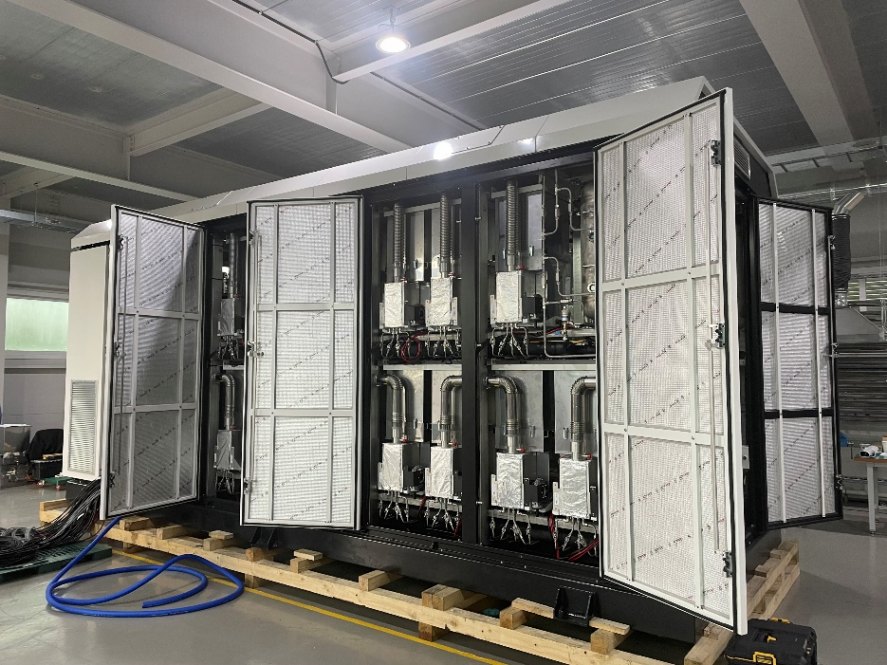Eight solid oxide fuel cell units will be donated to the Center for Clean Energy Engineering

C2E2'a new solid oxide fuel cell units provide high efficiency power from a variety of sources.
The Center for Clean Energy Engineering (C2E2) is set to receive a significant gift that will contribute to UConn's goal of carbon neutrality.
InfraPrime - an international company that empowers its clients to reach carbon neutrality goals, and eventually carbon negativity - is donating eight solid oxide fuel cell (SOFC) units to UConn. The units are versatile in their fuel choices, capable of directly generating electricity at a high efficiency from a variety of fuels, including hydrogen, ammonia, hydrocarbons, and biomass. When operating reversibly, those units can be used to produce hydrogen from water or convert CO2 to fuels.
Each individual unit is roughly the size of a dishwasher. Once delivered, they will be installed at C2E2 on the Depot Campus and at the Engineering Science Building at UConn Storrs to offer advanced research and training opportunities for UConn faculty members and students.
"This incredibly generous donation by InfraPrime not only shows how much of a difference philanthropy can make in shaping educational and technological advancements, but also creates the opportunity for UConn to become a leader in advancing the understanding and application of solid oxide fuel cell technology," says UConn President Radenka Maric. "With the global fuel cell market expected to reach nearly $37 billion by 2030, and with solid oxide fuel cells one of the fastest growing segments of the market, it's critical for UConn and Connecticut to play a major role in the future of this clean energy technology. This transformative gift moves us closer to that goal."
InfraPrime founder Alberto Ravagni said the units are derived from commercial units, of the same type that powered Microsoft's Advance Energy Laboratory and Data Center in Seattle. The installation received a DCD Award doubling the efficiency of energy delivery to the servers.
Microsoft is a pioneer in the use of fuel cells to power data centers and to eliminate diesel back-up. According to the company's official blog, fuel cells are increasingly being used for data centers for back-up and prime power.
"What we just witnessed - using fuel cells to replace diesel generators – was, for the data center industry a moon landing moment," writes Sean James, Microsoft's director of data center research. "We have a generator that produces no emissions."
InfraPrime is scaling-up the concept of Utility Availability Zone, where the grid interactive data centers and utilities cooperate in maximizing the benefits of the clean energy assets and in accelerating the transition to 100% of electricity consumption, 100% of the time matched by zero carbon energy.
Ravagni says that InfraPrime fuel cells technology partner Fuel Cells Innovation will support the advancement of SOFC and SOEC technology at C2E2, marking the initial stride towards establishing product development and manufacturing operations in Connecticut.
"The same microgrids used for the data center can provide zero carbon, reliable energy to a town or university," Ravagni says. "Everybody wants to have power that is resilient, reliable, and affordable."
The units contribute to UConn's ongoing and future initiatives as a leader in clean energy research and sustainability. More than 100 faculty members are conducting related projects, across a myriad of disciplines. Additionally, UConn's main campus is adding infrastructure to support a goal of carbon neutrality by 2030, greatly reducing carbon dioxide emissions. The University's strategic plan calls for UConn to be carbon net zero by 2040.
C2E2 is a major part of UConn's plans and expertise. The multidisciplinary center is a leader in education, research, and innovation of sustainable energy systems. Director Xiao-Dong Zhou says the implementation of SOFC/SOEC units at UConn underscores its leadership and elevates UConn's status in sustainable energy research in three critical areas.
"First, this donation will enhance industrial collaborations, providing UConn with a platform to engage with industry leaders in residential power, propulsion, hydrogen production, and energy storage," Zhou says. "Second, the SOFC/SOEC units offer exceptional educational and research opportunities, bridging practical experiences with theoretical learning. This integration enhances UConn's curriculum with industry-relevant skills in advanced energy systems.
"Third, implementing real-world SOFC/SOEC units at UConn will enable us to develop zero-emission and grid-resilient energy solutions on campus, exemplifying UConn's commitment to sustainability and serving as a model for innovative energy practices," he continued. "This approach contributes significantly to global efforts in green energy advancements.
The gift is also the result of a strong collegial relationship between Ravagni and Maric that stretches back decades. Ravagni says he and UConn's president were connected through their clean energy research and technology development.
While Maric pursued further research and academia, Ravagni went into industry, founding InfraPrime in 2007. Now the camaraderie between the two clean energy experts has come full circle through the gift of the SOFCs and the potential they represent to UConn's institutional goals and research pursuits.
"The dream of every scientist is to have the progress they've made become useful to everybody," Ravagni says. "InfraPrime has taken all the needed to make the transition (to net zero). Now we are coming together with UConn to bring innovation to scale."






